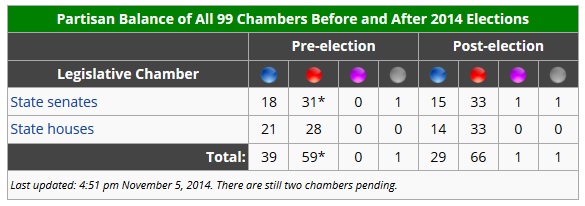Republicans trounce Democrats in legislative races from coast-to-coast

By Eric Boehm | Watchdog.org
Republicans swept into control of the U.S. Senate on Tuesday, but that only begins to tell the story of a mid-term election that turned into an electoral rout.
From Nevada to New Hampshire, Republicans won resounding victories in state-level elections that swept more GOP lawmakers into state capitols and flipped control of at least eight legislative chambers. Combined with unexpected victories in gubernatorial races in Illinois, Maryland and Massachusetts, the Republicans are poised to control a higher percentage of state governments than at any point in the past 25 years.
With a few dozen state legislative races still undecided on Wednesday afternoon, Republicans have scored a net gain of more than 250 seats across the nation’s 99 legislative chambers, according to an analysis by Ballotpedia, which tracks state-level elections.
REPUBLICANS RISING: Already in control of a majority of state legislative chambers before Tuesday, the GOP expanded its dominance and now control two-thirds of all state lawmaking bodies.
“Across the board, what we’re seeing is that chambers flipped from Democratic control to Republican control,” said Geoff Pallay, director of strategic projects for the Lucy Burns Institute, the Wisconsin-based think tank that runs Ballotpedia. “There were some that we expected to see and others that were real surprises.”
Republicans took the majority in nine of those chambers – winning the Colorado Senate, Maine Senate, the Minnesota House, Nevada House and Senate, the New Hampshire House, the New Mexico House, the New York Senate, and the West Virginia House. The GOP is set to control at least 64 legislative chambers.
Democrats also lost control of the West Virginia Senate, which is now evenly split between the two major parties.
The wins in Nevada were perhaps the most unlikely, as Republicans managed to flip a 25-17 Democratic majority in the state House by picking up 10 seats.
“This is a night to remember. This is a night to savor,” said newly re-elected Nevada Gov. Brian Sandoval during his victory speech Tuesday.
It was the first time in more than two decades that Republicans won a majority of the legislative seats in Nevada, Pallay said.
The win in New Mexico gave Republicans control of that state House for the first time since 1952.
With some election results still pending Wednesday afternoon, there were two legislative chambers where control was still up for grabs.
The high water mark for Republicans, on an election night where it seemed the tide might never stop rising, came in Maryland.
A state with only 900,000 registered Republicans and more than 2 million registered Democrats should never have been able to elect Republican Larry Hagan as its next governor. But that’s exactly what happened, as Hagan edged out Lt. Gov. Anthony Brown, the heavily favored Democratic nominee.
Nearly as surprising were Republican gubernatorial wins in reliably-blue states like Massachusetts and Illinois.
Charlie Baker will become Massachusetts’ first Republican governor since Mitt Romney lost his re-election bid in 2008. In Illinois, Bruce Rauner defeated Democratic incumbent Pat Quinn to break a 12-year run of Democratic control.
Republicans even made gains in California, where anything other than a Democratic majority is unthinkable. The GOP won enough races to break the Democratic super-majority in Sacramento, which will force Democrats to court Republican support on some issues.
It all adds up to this: Democrats have been swept from power in all but a handful of states.
Before the election, Democrats enjoyed a so-called “trifecta,” meaning majority control of both legislative chambers and the governorship, in 13 states, Pallay said.
That total has been reduced to just seven after the votes were counted.
Republicans lost only one such “trifecta” on Tuesday. In Pennsylvania, Gov. Tom Corbett was unseated by Democratic challenger Tom Wolf. Of the 12 incumbent Republican governors seeking re-election this year, Corbett was the only casualty.
Despite Corbett’s loss, the GOP actually expanded its majority in both chambers of the Pennsylvania General Assembly.
It was that kind of night for Democrats.
“For Democrats, there were no coattails for candidates farther down the ballot,” said Pallay.
As of Wednesday afternoon, Democrats appeared to have expanded their majority in exactly one of the nation’s 99 legislative chambers: the Oregon Senate.
Everywhere else, the red tide was rising.







